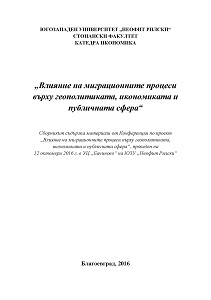ОПИТ ЗА ТЕОРЕТИЧНО ОБЯСНЕНИЕ НА ЕВРОПЕЙСКИТЕ ПРОБЛЕМИ, СВЪРЗАНИ С ИСЛЯМА, РАДИКАЛИЗАЦИЯТА ВСРЕД МЛАДИТЕ ХОРА И МИГРАЦИОННИЯ НАПЛИВ КЪМ ЕС
AN ATTEMPT TO THEORETICALLY EXPLAIN THE EUROPEAN PROBLEMS, ASSOCIATED WITH ISLAM, THE RADICALIZATION OF THE YOUNGER GENERATION AND THE MIGRANTS INFLUX INTO THE EU
Author(s): Plamen Pachev
Subject(s): Politics / Political Sciences, Social Sciences
Published by: ЮГОЗАПАДЕН УНИВЕРСИТЕТ »НЕОФИТ РИЛСКИ«
Keywords: Migrants; integration; Islam; terrorism and extremism; epistemological occupation
Summary/Abstract: The article deals with issues, associated with the new challenges facing the European societies and economies, provoked by the Islamic terrorism and extremism, the influx of compact masses of refugees from Arab and other Islamic states into Europe, as well as the difficulties, associated with an eventual integration of the migrants within targeted countries in Europe. The basic point of departure in this case is the theory of radical liberalism as the leading socio-economic and philosophical doctrine, expounding and exonerating the “development schemes” of the Western industrial societies. This doctrine is discussed in its three aspects – “liberal racism”, communism and nationalism as manifested forms of a peculiar “industrial-technological” totalitarism. It is this particular “totalitarism” which is being confronted, within the modern Western societies, by the essence and oddities in the development of the so called “traditional societies”, within which a peculiar form of opposition can emerge expressing itself in acts of extremism and unacceptable for the Western societies forms of socio-economic constructs. The analysis herein contained is based to a certain extent on the hypothesis for an “epistemological occupation”, formulated and substantiated by Alexander Dugin, who has lately gained popularity in Bulgaria as well. In the concluding part of the article, certain new data, derived from sociological research conducted in Bulgaria is sited, according to which the Bulgarian society demonstrates a measure of skepticism regarding the possibilities and perspectives for the integration of the migrants, while the inference is, that any eventual resolution of the problem will require a well-coordinated and effective policy on the level of the whole European Union.
Book: ВЛИЯНИЕ НА МИГРАЦИОННИТЕ ПРОЦЕСИ ВЪРХУ ГЕОПОЛИТИКАТА, ИКОНОМИКАТА И ПУБЛИЧНАТА СФЕРА
- Page Range: 124-137
- Page Count: 14
- Publication Year: 2016
- Language: Bulgarian
- Content File-PDF

